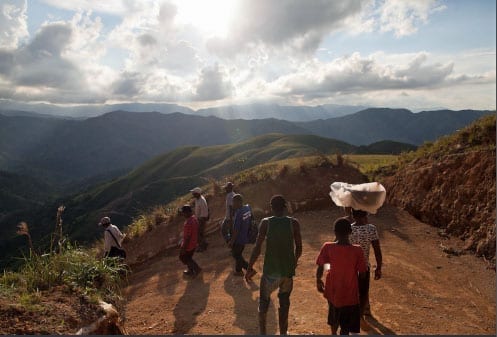
Feb 2, 2016
If the current political impasse in Haiti is resolved, lawmakers are likely to consider how to develop the country’s untapped gold and copper veins—and the process will determine the extent to which workers achieve their share of economic prosperity.
“Given the dearth of decent employment opportunities and pervasive extreme poverty, workers are highly susceptible to exploitation and rights violations,” according to a new report, “Human Rights and Environmental Risks of Gold Mining in Haiti.”
“Building strong labor protections into the emerging regulatory regime for mining is therefore essential to guarantee the rights of Haitian workers,” the report asserts.
Metal mining in Haiti could yield an estimated $20 billion in gold alone. Between 2006 and 2013, foreign mining companies invested some $30 million to prospect for metals in Haiti. Yet as the report notes, mining activity in Haiti will occur in an environment “already characterized by widespread rights abuses, particularly deprivations of economic and social rights and denials of the right to information and political participation.”
Workers ‘Highly Susceptible to Exploitation’
Many Haitians are unaware of the potential of gold mining, and the current government has been negotiating new mining laws behind closed doors, according to Global Risk Insights. The report asserts that the next government will face pressure to open up the country to mining to alleviate deep poverty in the hemisphere’s poorest country.
More than two-thirds of Haitian workers lack formal employment, and those who have jobs typically earn wages far below the cost of living. Given the lack of decent employment opportunities and pervasive extreme poverty, workers are highly susceptible to exploitation and rights violations.
The report cites failed examples of foreign investment in the garment sector as a warning that workers may be promised much but receive little with the development of the gold mining industry. For instance, a $300 million factory complex in the northern town of Caracol displaced families dependent upon agriculture with the promise of creating up to 65,000 low-wage jobs. More than two years later, only an estimated 5,000 jobs have been created and workers are paid less than $7 a day—an amount insufficient to adequately feed a family.
The mining sector lacks the regulation and transparency of the apparel industry and so employers have less incentive to follow sound labor practices. Further, mining tends to be concentrated in isolated regions with few formal jobs—creating more potential for abuse of worker rights.
Steps for Safeguarding Workers
To protect the rights of Haitian workers, the Solidarity Center recommends that Haitian mining law should:
- Require compliance with the national labor code.
- Adopt the protections and measures outlined in the International Labor Organization’s Safety and Health in Mines.
- Include language to establish a formal workforce, in which workers have contracts, subcontracting is discouraged and local Haitian labor is hired.
- Stipulate guidelines for profit-sharing.
The 264-page report was compiled by the Haiti Justice Initiative and the Center for Human Rights & Global Justice, a member of the Haiti Advocacy Working Group, a Solidarity Center ally. Lauren Stewart, Solidarity Center senior program officer for the Americas, contributed to the report.
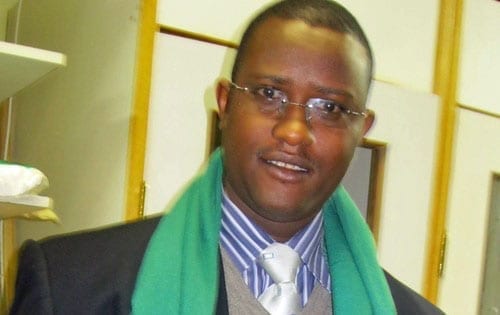
Feb 1, 2016
Alexandre Niyungeko did not flee Burundi last April when a source told him the police were planning to kill a few journalists and civil society leaders—as a warning to protesters and critics of the government—and his name was on the list.
And when anonymous callers told him his days were numbered, Niyungeko, president of the Burundi Union of Journalists (BUJ), persisted in Bujumbura, the capital, though he did go into hiding. “It wasn’t the first time someone had tried to intimidate me,” he says, explaining that, as head of the union representing 400 journalists, he often raised complaints about infringements on freedom of the press.
The threats escalated in the days after police shuttered independent radio stations and surrounded the Press House, where union and independent journalist organizations—among them the Burundian broadcasters, women journalists and a media monitoring organization—had offices, and summarily shut it down. “It’s the first time in the history of Burundi that the press was closed by police without explanation,” he says, adding that when he asked authorities who had amassed outside the building to see the order for closure, he was told: “If you continue to ask questions, you’ll be in trouble.”
Not long after, his neighbors warned him that strangers were asking about him and his routine at home.
“I was being hunted,” he says. “And that day I realized my family could be hunted, too.”
Indeed, his worst fears became reality when someone threw a grenade into his apartment when his wife and children, ages 3, 6 and 8, were home. Fortunately no one was injured. But Niyungeko knew that the only way to protect them all was to leave. In May 2015, he waited until his family had safely entered the airport transit area with tickets to fly out of Bujumbura before he set off on a separate journey. He made the dangerous overland trip, avoiding half a dozen checkpoints along the way, and met them in Rwanda.
More than 230,000 Burundians have fled their country to escape the violent crackdown that has raged since last April, when people took to the streets to protest President Pierre Nkurunziza’s announcement that he would run for a third term. Some 72,000 refugees—among them hundreds of union leaders and their members, including at least 250 teachers—have sought shelter in neighboring Rwanda.
The government’s efforts to intimidate and control the press has forced at least 100 journalists into exile, the Committee to Protect Journalists reports, and many others have been arrested and jailed, says Niyungeko. In addition, two Western journalists were arrested and briefly held last week.
Niyungeko says it is difficult for the journalists’ union to continue activities, with many leaders and members in exile, though they managed to organize a workshop for 30 Journalists in Kigali, 20 exiled and 10 from Bujumbura. Meanwhile, they continue to monitor the situation at home.
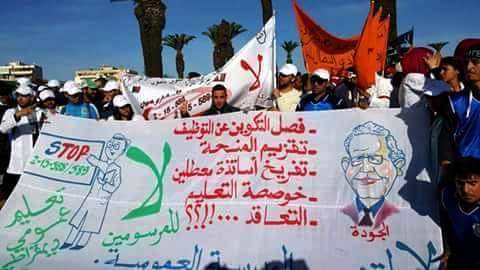
Jan 27, 2016
Thousands of teacher trainees, holding banners reading “Marching for dignity and justice,” and chanting “We’re prepared to go to prison,” marched through the streets of Morocco’s capital, Rabat, this week to denounce two government decrees to cut scholarships and jobs.
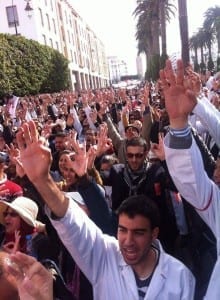
Teacher trainees defied government threats barring them from public protest. Credit: Hicham Ahmadouch/UMT
The protest followed a meeting between representatives of the teacher trainees and the government, which refused to annul the two decrees but agreed to recruit an additional 3,000 teacher trainers not covered by the 2016 fiscal year budget.
The workers, who have been on strike for two months, took to the streets despite government threats against unauthorized marches. At a rally earlier this month, several teacher trainees were beaten by police. Primarily in the their 20s and 30s, teacher trainees say the government’s decrees will further fuel the country’s already high youth unemployment rate, which, at more than 20 percent, is double the nation’s overall unemployment rate.
Morocco’s head of government, Abdelilah Benkirane, asserted that he will not “repeal the government decrees,” regarding teacher trainees.
Earlier this month, some 4,000 workers staged a sit-in outside the parliament in Rabat to protest worker cutbacks in pensions and ongoing worker rights violations, including the attacks on the teacher trainees.

Jan 26, 2016
The president of the Malaysian Trades Union Congress (
MTUC), Mohd Khalid Atan, passed away this morning, reports MTUC Secretary-General N Gopal Kishnam. The MTUC is a Solidarity Center ally.
“MTUC is deeply saddened by the loss of the most credible individual who gives priority to the interests and welfare of workers,” said Gopal in a statement today.
Khalid, 63, was first appointed by the Congress as its president in 2011 and was reappointed in 2013, according to Astro Awani, a Malaysian news outlet.
MTUC is at the forefront of protecting worker rights, including documenting the exploitation of hundreds of migrant workers in Malaysia.
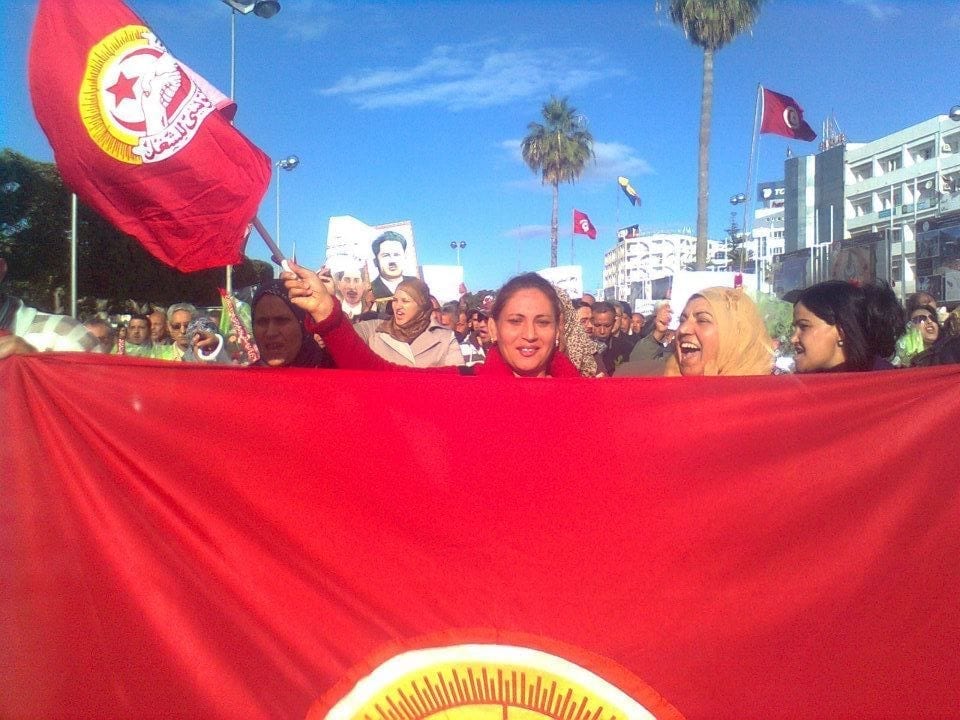
Jan 23, 2016
Days of economic protests in Kasserine, Tunisia, are the result of “the persistent marginalization” and “the ruling elite’s failure to achieve the hopes and expectations of Tunisians,” especially the young, according to the country’s union federation, Union Générale Tunisienne du Travail (UGTT).
“The UGTT supports the legitimate demands of hundred of thousands of marginalized and unemployed,” the federation said in a statement. The UGTT, a Solidarity Center partner, is calling on the government to “take urgent measures to remedy to this situation and to engage in a constructive and serious dialogue.”
Protests began on January 19 after a man committed suicide reportedly because he was denied a government post. Kasserine, with few jobs and a high poverty rate, is among many cities and towns in Tunisia’s central and border areas where workers, especially young people, are unable to support themselves and their families.
The government declared an indefinite nationwide curfew yesterday. Police use of tear gas to disperse the crowds sparked protests in several other towns, including Tunis, the capital, where hundreds took to the streets.
The UGTT is urging people to demonstrate peacefully and avoid violence, and is calling on the government, political parties and civil society organizations to join in national dialogue to address social tension and develop a strategy to fight unemployment.
The events echo the December 2010 suicide of a 23-year-old market vendor, Mohamed Bouazizi, whose death sparked protests for jobs and democracy that spread quickly across the country and ignited the Arab uprising.
Tunisian trade unionists, supported by UGTT, played a central role in the 2011–2012 revolution, and public outcry led to the ouster of President Zine el-Abidine Ben Ali, who had ruled Tunisia for 23 years, holding sway over a large percentage of the Tunisian economy, controlling real estate, hotels, airlines, telecommunications and automobiles.






